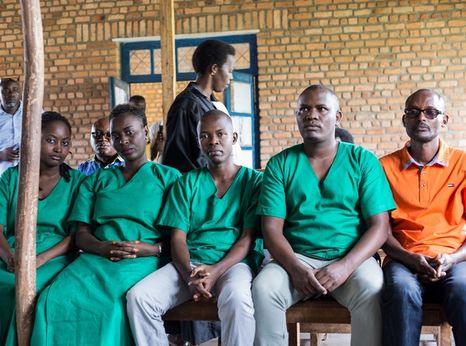Journalists sentenced to imprisonment

Image: © TCHANDROU NITANGA/AFP/Getty
Iwacu journalists Agnès Ndirubusa, Christine Kamikazi, Egide Harerimana, Térence Mpozenzi and their driver, Adolphe Masambarakiza were in Bubanza to investigate reports of clashes between the security forces and an armed group in the province. As is their usual practice, they had informed the provincial authorities of their plan to travel to the area, only to be arrested upon arrival.
On 31 October 2019, the Council Chamber of the Bubanza Tribunal decided to keep the five in detention at Bubanza Central Prison where they had been transferred from police cells by the provincial prosecutor’s office five days earlier. They were charged with “undermining state security” the same day. In a statement, the Prosecutor General claimed that the five were not arrested for being journalists, but rather for the facts for which they were accused.
On 20 November, the Ntahangwa Court of Appeal confirmed the decision of the Bubanza Tribunal to keep the journalists in detention and decided to release the driver on bail.
Iwacu is one of the few independent news outlets still operating in Burundi. Since the crisis began in April 2015 over President Pierre Nkurunziza’s bid for a third term in office, journalists, human rights defenders and opposition members have been targeted and many have been forced into exile.
The move by President Nkurunziza sparked mass demonstrations as many believed it violated the Arusha Accords that ended a decade long civil war. The Accord prohibited anyone to preside over the country for more than 10 years. This ban was also reaffirmed in the 2005 Constitution. Demonstrations against President Nkurunziza’s third term in 2015 were violently dispersed by security forces, resulting in scores of people arrested, injured, tortured and killed. Many also went missing.
On 13 and 14 May 2015, a group of senior military officers tried to overthrow President Nkurunziza’s government. Four independent media outlets, Radio Publique Africaine, Radio Tele Renaissance and Radio Isanganiro were destroyed by security forces in the aftermath of the failed coup. They were accused of sympathising with the coup plotters and to have broadcasted their messages.
Esdras Ndikumana, who worked as a correspondent for Radio France Internationale (RFI) and Agence France Presse, was arrested by the SNR on 2 August 2015 as he was taking photos at the scene where General Adolphe Nshimirimana was killed. He was tortured while in detention and released the same day.
Antoine Kaburahe, Iwacu Founder and Director, was also forced to leave the country after he was questioned by the Prosecutor’s office in December 2015 over his alleged contacts with soldiers reportedly responsible for the failed coup of 13-14 May 2015.
Jean Bigirimana, another Iwacu journalist, went missing on 22 July 2016 and his whereabouts remain unknown. According to his colleagues, Jean was lured to Bugarama for information on a case he was working on. He is believed to have been arrested by the National Intelligence Service (SNR) in Bugarama town, outside Bujumbura.
His family have been forced into exile because of threats his wife received following her public statements on the enforced disappearance of her husband.